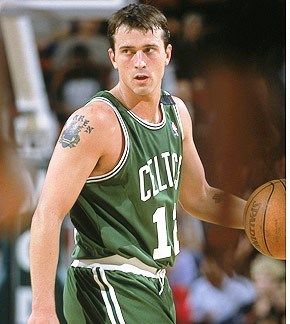
Basketball player Chris Herren had an hour and 10 minutes before a game in which he would be announced for the first time as the point guard for his hometown Boston Celtics when he picked up his phone and told his Oxycontin dealer “My dream is about to come true and I don’t think I can do it without you.”
Herren said he was at a point where his body needed the painkiller and was checking his phone every 10 minutes for his dealer to arrive.
When the dealer ran into traffic, Herren said, he ran into traffic to meet with him.
When he made it back, Herren said, it was too late for him to hear his name announced as the starting point guard.
“Only six people in Celtics history ever heard those words,” Herren said. “And I missed them, I don’t remember them.”
Herren was invited by the Herricks School District to tell his story twice at Herricks High School on Tuesday – earlier in the day to the high school class and in the evening to parents and members of the community.
He said he was surprised by the relatively small number of parents in attendance during the evening presentation in light of the large numbers of e-mails he received from the students he had spoken to at the earlier session.
But, he said, even if his presentation touched a small crowd it meant something.
“Even if its just 10 people its worth it,” he said.
Herren was the subject of the Emmy-nominated 2011 ESPN 30-for-30 documentary “Unguarded,” which chronicled his drug use and recovery. That same year he started the Herren Project, which helps to provide assistance to those suffering from addiction.
Herren said his addiction began during a party, when he was sold a small, yellow pill for $20, he said, something he brushed off as trivial.
“I laughed, I said ‘I can’t believe you’re getting away with charging $20 for one pill’,” Herren told the audience in the Herricks High School auditorium on Tuesday. “I had no idea that this decision that day was about to change my life forever.”
Herren said he would soon go from a $20 dollar pill to a $25,000 Oxycontin habit, a decision that would send him spiraling into suicide attempts, heroin addiction felony charges and the near-loss of his family.
His road to addiction began when he was offered a position on one of Europe’s top basketball teams, he said, and on his way to Italy smuggled 300 80 milligrams Oxycontin tablets in his luggage.
“The 300 80s that I had smuggled were in there with the best intentions,” he said. “I met this doctor in Boston and we agreed on paper that every day I would cut my milligram down and after five months I would shake it. Unfortunately painkillers don’t play that way.”
His addiction lead to him running out of pills and substituting his withdrawals with heroin, he said.
“I had two choices today, I said. I either get help or get high,” he said.
The worst past of it, Herren said, was answering to his son.
“Why do you want to be my daddy anymore,” his son had asked him. “When I was young I thought I had all the answers and now I couldn’t answer a 5-year-old.”
Herren, who said he has been sober since Aug. 1, 2008, advocates for a drug-free lifestyle and informs parents of how to help their children be aware of drug abuse.
He said he began smoking and drinking in the basements of friends in his hometown in Massachusetts. His friends’ parents, he said, told him the basement was a safe environment.
“Some people never leave those basements, it wasn’t safe,” he said. “Why was it that I had to drink and smoke to feel cool enough to walk into that basement?”
Herren said much of the feedback he received from his presentation to the high school class earlier in the day had to do with feelings of inadequacy.
“I don’t think we put enough emphasis on the kids that are able to be themselves,” he said. “I think we glorify the idea of basement raves.”
Herren said that not all facilities are suitable for each individual problem, citing his own father.
“My father recently became suicidal in past months and is addicted to a beer can,” he said. “Bringing him to a facility with people in their 20s who are suffering from harder drug abuse isn’t going to help him.”
Herren said that the battle against substance abuse begins with education and that it is not enough to show kids the final days of substance abuse but to show them the first days.
“They already know the worst part of it,” he said. “They need to see how it all begins.”






